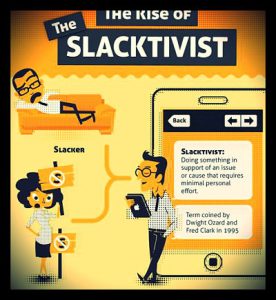This blog post we will be discussing slacktvism, what is it? Slacktivism, is the actions preformed via the internet in support of political or social causes, but regarded as requiring little time or effort. Although social media has made it easier to communicate, organize and otherwise prepare a protest, it has made people complacent with just appearing to support a cause, and has many people questioning weather the time and effort is worth it when you can just make a post. However, is a post as effective as a physical protest, for the most part no. Online protests dehumanise the cause detaching it form reality and the people involved making it easier for those who are being protest against to ignore the issue. For some people the only reason they may post about an issue is due social pressure, although individuals have may not researched and do not posses the knowledge to understand what they sharing, outside influences impact what they naively choose to support even thought it may not be showing both sides the arguments meaning there support for the protest is futile as they have desire to help any further for them clicking a button is enough. Similar to a mob mentality, often a complex idea is posted online without both sides of the argument as it is difficult to summarise many of the issue and still keep the attention of the audience, often it is so condensed that even with someone sharing or tweeting the post it is still not beneficial as people don’t fully understand the subject and are too lazy to do their own research. People prefer to share a 5 minute video summarising half the points of a topic and expect it to make a difference, that is slacktavism.

For those that remember Kony 2012 it was a great example of slacktivism how a vastly complex problem was simplified, although there was a good reason for the cause it nothing actually changed even thought there were millions of supporters sharing and posing about it. Awareness of an issue is only part of a solution although around 100 million people have see the video made by the charity Invisible Children, knowledge of a situation is not the answer, it is a step in the right direction. Yet by clicking like sharing or putting up posters it doesn’t actually effect the situation. Often and in the case of Joseph Kony the Ugandan military leader online protests are just ignored. The kony 2012 video captured the ethos of a stereotypical slacktavist, and as put by Aljazeera’s, Sarah Kendzior “Viewers oblivious to complex foreign conflict are made heroic by watching a video, buying a bracelet, hanging a poster. “Sarah continues with stating that viewer’s emotional response and desire to catch joseph kony was sincere buying a bracelet didn’t actually help. Furthermore, it may be argued that videos like Kony 2012 distract us from the real issues and the causes of the issues, this may be due to oversimplification of the issue misleading people by not showing the true cause meaning people can never know what to do that will stop and prevent another Kony 2012. Although slacktivism is often used in a negative term it can sometimes and often does help even the slightest bit of awareness can lead to more donations for a charity. A great example of so called slacktivism helping a great deal for a cause is the ALS ice bucked challenge that went viral in 2015.

For those of you living under a rock with no idea what the ice bucket challenge was people literally pouring icy water over their heads all in the name of ALS or Amyotrophic lateral sclerosis a motor neuron disease. Through the almost gamification of the trend by calling out friends or family to also take part the ice bucket challenge had huge impact in raising money towards the cure for ALS, and it raised more than £7 million. This is the other side of the argument of slacktivism it can achieve great thing through awareness even if it is not understood properly understood. So what is your opinion of slacktivism? Is posting your outrage or support true activism or is activism taking action like the saying, actions speak louder than words. What cannot be argued though is how it can benefit some causes through donation like the ALS foundation. So is it easier to protest as people can communicate and spread messages faster or has it made people lazy, by only spreading awareness not actually affecting the issue?
Furthermore, through internet outrage people often form communities were people support one another and witch may eventually lead to some form of action taking place. We will be discussing a related topic on the next blog how the internet effects real life protests like the Arab springs or the London riots.
Leave a Reply